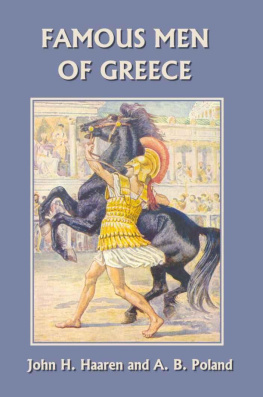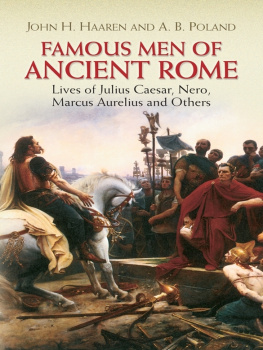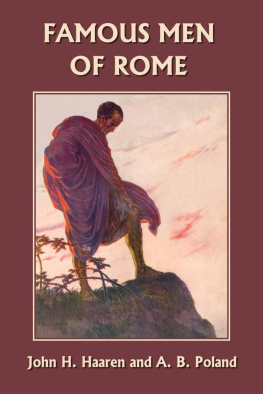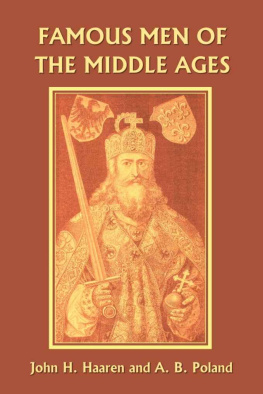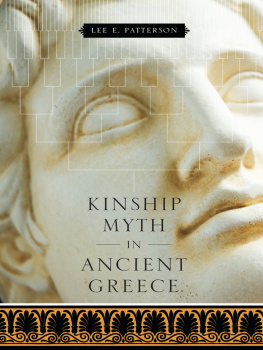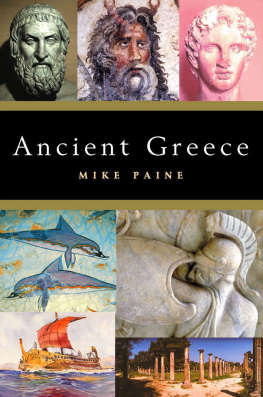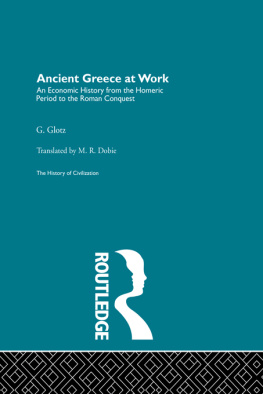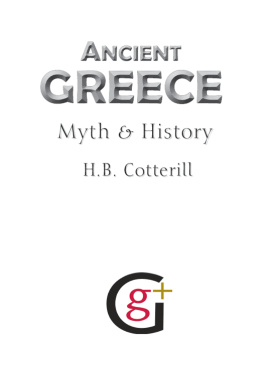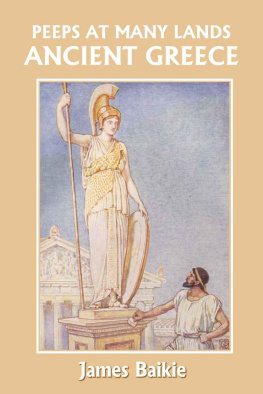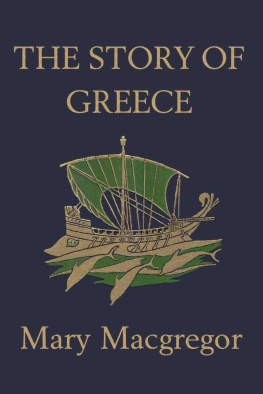John H. Haaren - Famous Men of Greece
Here you can read online John H. Haaren - Famous Men of Greece full text of the book (entire story) in english for free. Download pdf and epub, get meaning, cover and reviews about this ebook. year: 2006, publisher: Yesterdays Classics, genre: Religion. Description of the work, (preface) as well as reviews are available. Best literature library LitArk.com created for fans of good reading and offers a wide selection of genres:
Romance novel
Science fiction
Adventure
Detective
Science
History
Home and family
Prose
Art
Politics
Computer
Non-fiction
Religion
Business
Children
Humor
Choose a favorite category and find really read worthwhile books. Enjoy immersion in the world of imagination, feel the emotions of the characters or learn something new for yourself, make an fascinating discovery.
- Book:Famous Men of Greece
- Author:
- Publisher:Yesterdays Classics
- Genre:
- Year:2006
- Rating:3 / 5
- Favourites:Add to favourites
- Your mark:
- 60
- 1
- 2
- 3
- 4
- 5
Famous Men of Greece: summary, description and annotation
We offer to read an annotation, description, summary or preface (depends on what the author of the book "Famous Men of Greece" wrote himself). If you haven't found the necessary information about the book — write in the comments, we will try to find it.
Famous Men of Greece — read online for free the complete book (whole text) full work
Below is the text of the book, divided by pages. System saving the place of the last page read, allows you to conveniently read the book "Famous Men of Greece" online for free, without having to search again every time where you left off. Put a bookmark, and you can go to the page where you finished reading at any time.
Font size:
Interval:
Bookmark:
All rights reserved. No part of this book may be reproduced or retransmitted in any form or by any means without the written permission of the publisher.
This edition, first published in 2010 by Yesterday's Classics, an imprint of Yesterday's Classics, LLC, is an unabridged republication of the work originally published by American Book Company in 1904. This title is available in a print edition (ISBN 978-1-59915-045-1).
Yesterday's Classics republishes classic books for children from the golden age of children's literature, the era from 1880 to 1920. Many of our titles are offered in high-quality paperback editions, with text cast in modern easy-to-read type for today's readers. The illustrations from the original volumes are included except in those few cases where the quality of the original images is too low to make their reproduction feasible. Unless specified otherwise, color illustrations in the original volumes are rendered in black and white in our print editions.
The study of history, like the study of a landscape, should begin with the most conspicuous features. Not until these have been fixed in memory will the lesser features fall into their appropriate places and assume their right proportions.
The famous men of ancient and modern times are the mountain peaks of history. It is logical then that the study of history should begin with the biographies of these men.
Not only is it logical; it is also pedagogical. Experience has proven that in order to attract and hold the child's attention each conspicuous feature of history presented to him should have an individual for its center. The child identifies himself with the personage presented. It is not Romulus or Hercules or Csar or Alexander that the child has in mind when he reads, but himself, acting under similar conditions.
Prominent educators, appreciating these truths, have long recognized the value of biography as a preparation for the study of history and have given it an important place in their scheme of studies.
The former practice in many elementary schools of beginning the detailed study of American history without any previous knowledge of general history limited the pupil's range of vision, restricted his sympathies, and left him without material for comparisons. Moreover, it denied to him a knowledge of his inheritance from the Greek philosopher, the Roman lawgiver, the Teutonic lover of freedom. Hence the recommendation so strongly urged in the report of the Committee of Tenand emphasized, also, in the report of the Committee of Fifteenthat the study of Greek, Roman and modern European history in the form of biography should precede the study of detailed American history in our elementary schools. The Committee of Ten recommends an eight years' course in history, beginning with the fifth year in school and continuing to the end of the high school course. The first two years of this course are given wholly to the study of biography and mythology. The Committee of Fifteen recommends that history be taught in all the grades of the elementary school and emphasizes the value of biography and of general history.
The series of historical stories to which this volume belongs was prepared in conformity with the foregoing recommendations and with the best practice of leading schools. It has been the aim of the authors to make an interesting story of each man's life and to tell those stories in a style so simple that pupils in the lower grades will read them with pleasure, and so dignified that they may be used with profit as text-books for reading.
Teachers who find it impracticable to give to the study of mythology and biography a place of its own in an already overcrowded curriculum usually prefer to correlate history with reading and for this purpose the volumes of this series will be found most desirable.
The value of the illustrations can scarcely be over-estimated. They will be found to surpass in number and excellence anything heretofore offered in a school-book. For the most part they are reproductions of world-famous pictures, and for that reason the artists' names are generally affixed.
I N the southern part of Europe is a little country called Greece. It is the home of a nation called the Greeks, and Greeks have lived in it for more than three thousand years. In olden times they believed that before they came to the land it was the home of the gods, and they used to tell wonderful stories of what happened when the gods lived in the country. One of these stories was about a god called Cronos, and his children.
Cronos was the first king of the gods. He had a wife named Rhea. His mother told him that one of his children would take his kingdom from him. He determined that this should never happen, and so he swallowed his children as soon as they were born. His cruelty distressed Rhea very much, and when a sixth child was born she made a plan to save its life. She gave Cronos a stone wrapped in baby-clothes, and this he swallowed.
Then Rhea took the child and hid him in a cave. And though the cave was dark he filled it with bright light; so she named him Zeus, which means brightness. We call him Jupiter.
Jupiter had one of the strangest nurses that a baby ever had. It was a goat. However, she took such good care of him that when she died she was changed into a group of stars, which shine in the sky to this day.
When Jupiter grew up he went to war against his cruel father. Cronos persuaded some giants, called Titans, to help him in fighting Jupiter. These Titans were so strong that they pulled up hills and mountains and threw them at Jupiter as easily as boys throw snowballs at one another. Jupiter soon saw that he must find some match for the Titans. So he asked another family of giants to aid him. They were called Cyclops, or Round-Eye, because each had only one eye, which was round and was in the middle of his forehead. The Cyclops were famous blacksmiths, and they made thunder and lightning for Jupiter. So when the Titans hurled mountains, Jupiter hurled back bolts of thunder and flashes of lightning. The battle was a terrible one. Jupiter was the victor.
After this great battle Jupiter made Cronos bring back to life the children whom he had swallowed, and then he gave to each of his brothers and sisters a part of the kingdom of their wicked father. He made himself the king of the gods, and for his own kingdom he took the blue sky. He made his sister Here, whom we call Juno, the goddess of the clouds and queen of all the gods.
To his brother Poseidon, whom we call Neptune, he gave the ocean, and he made his brother Hades, whom we call Pluto, king of the regions under the earth and sea.

NEPTUNE AND HIS HORSES [Escurial Tapestries]
He made his sister Demeter, whom we call Ceres, queen of the grains, the fruits and the flowers.
His sister Hestia, whom we call Vesta, he made the goddess of fire and gave her charge of the homes and hearthstones of men.
W HEN the kingdom of Cronos had been divided, the new rulers found a great deal to do. In the depths of the sea Neptune built a palace whose floor was of snow-white shells and blood-red coral, while the walls were of shining mother-of-pearl. When the waves above his palace were wild, Neptune would yoke his brazen-hoofed horses to his chariot and, standing with his trident, or three-pronged spear, in his hand, would drive swiftly over the water. And as the brazen hoofs of the horses trampled upon the waves the sea became calm.
Font size:
Interval:
Bookmark:
Similar books «Famous Men of Greece»
Look at similar books to Famous Men of Greece. We have selected literature similar in name and meaning in the hope of providing readers with more options to find new, interesting, not yet read works.
Discussion, reviews of the book Famous Men of Greece and just readers' own opinions. Leave your comments, write what you think about the work, its meaning or the main characters. Specify what exactly you liked and what you didn't like, and why you think so.

